Jun 26, 2018 | Non categorizzato
Meeting Jesus Since I becoming mayor of our town I cannot walk along the street without someone stopping me to discuss an issue or just to greet me. Even when I’m in church, I find it difficult to be alone with Jesus. So one Sunday I went to Mass in a nearby town, hoping not to be recognized. When I got there, I found the church was packed with people attending a special liturgy celebrated by the bishop. I saw a woman sitting outside the church and I gave her some money. A little further on, there was another person begging, a man with a badly disfigured face. I walked passed him. But then it was as if I heard a voice inside me saying: “You came here because you wanted to meet Me. Here I am, in this poor woman and in this man who is suffering”. I turned back. The man was still there, happy that I had come back to find him. G. – Italy Superstition I got into a taxi and noticed that the car was full of “charms”, indicating the superstitious beliefs of the driver. As we drove along, I took courage and said, “You know, I believe in God, and I place all my trust in Him alone”. He listened to my words in silence. A few weeks later, I called for a taxi again and to my surprise I discovered it was the same driver in the same car. With even greater surprise I noticed that all the charms had disappeared, and a set of rosary beads was hanging from the rear-view mirror! N. -Switzerland Teamwork Three of us – a nurse, a laboratory technician and a doctor – work in the same hospital, in different departments. We believe that living the Gospel can not only transform people individually but can also renew whole environments, work places and social structures. Motivated by this belief, we try to meet together before work every morning, even just for a moment to share our challenges, efforts and joys. We keep on discovering how our commitment to love everyone can be practically employed in our workplace in the exercise of our professional duties every day. E., L. and B. – Italy Money under the pillow I was walking out of church with my son when a woman came up and asked us for money. I opened my wallet and gave her what I found there, 20 Euro. My son was astounded and told me I had given her too much. But I reassured him that Jesus is present in each poor person and I felt it was right to give her all I had with me. When we got home I started to tidy up a room we had offered to guests who had just left, a couple from another city visiting a sick relative. My son came to help me. As he lifted up the pillow, we found 200 Euro lying there! We had freely offered these people the means to be able to stay close to a loved one who was suffering, and they had decided to respond in this way. M.G. – Italy The ice-hockey match I am a real fan of ice-hockey. One day I couldn’t wait for school to finish so I could rush home to watch a big match on television. As soon as the final bell rang, I sped away on my moped. But I had only gone a few meters when I realized I had a flat tyre. As fast as possible I tried to pump it up, but after another hundred meters it had gone down again. Then to cap it all, it started to rain. I could feel my temper getting worse with every step as I pushed my moped along the road. Then suddenly a thought came into my head: Jesus suffered so greatly on the cross, are you not able to accept this small inconvenience? And with that, I found peace within myself once more. G. – Holland

Jun 26, 2018 | Non categorizzato

NetOne is an international network of people involved in communication and media. “Media for a united world” is his mission.
It is an international network of professionals, students and media workers, born in Italy in June 2000as a result of the Congress ‘Communication and unity’ promoted by the Focolare Movement.
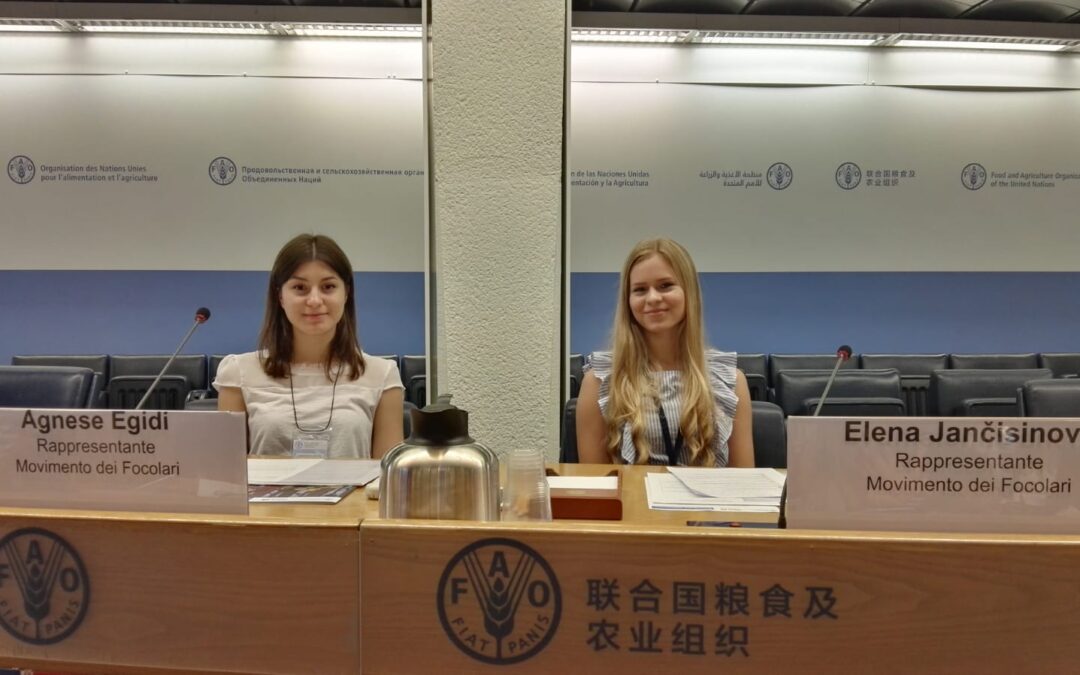
Jun 25, 2018 | Non categorizzato
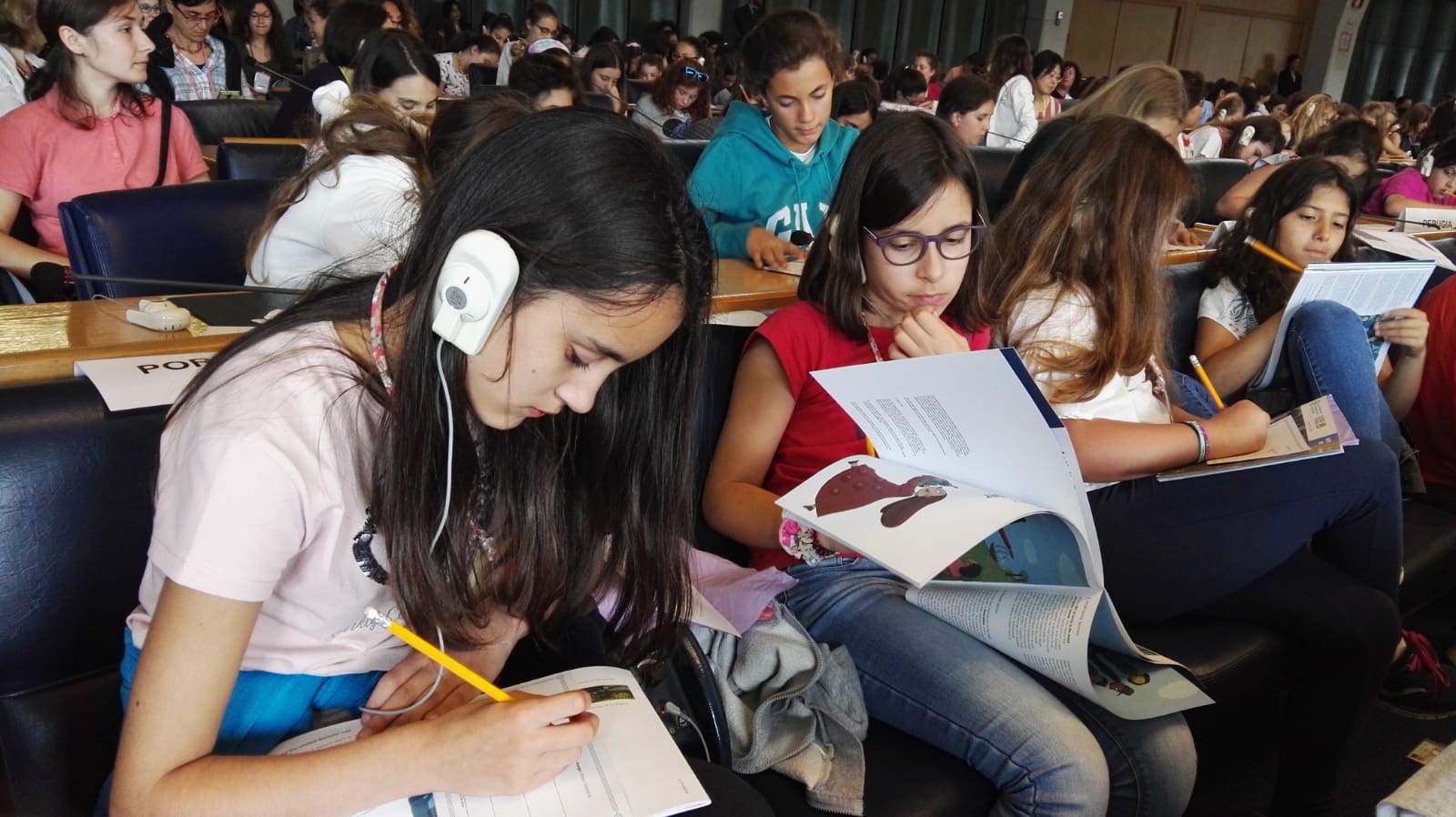 Today’s youth can become the first generation that will manage to eradicate hunger in the world. This is indicated by the 17 Sustainable Development Goals approved by the 193 United Nations Member States on September 25, 2015. The Member States agreed on the commitment to implement these goals within 15 years (2015-2030), and the “Zero Hunger Goal” is at the heart of the whole programme. The United Nations Food and Agriculture Organization (FAO) is very keen on achieving these objectives, so 630 young girls, aged 9 to 14 years, were gladly welcomed at its headquarters in Rome. This group of girls that belong to the Focolare Movement visited FAO on June 22, 2018. Many others worldwide followed this event through live streaming, and among them there were 400 young boys taking part in a congress at the Focolare International small town of Loppiano in Tuscany. It was the first time that the Movement’s young generations, who owe their origin to Chiara Lubich, were favoured with such an opportunity, that thrilled not only the girls seated in the prestigious plenary hall, but also FAO. “I’m so pleased to see this hall so full of young women”, commented Marcela Villareal, the FAO director for the division of partnerships and South-South cooperation. “I’ve been working here at FAO for more than 20 years and I have delivered many speeches in this hall, but I’ve never seen it so beautiful, so full of young ladies. Thank you for your all support towards the Zero Hunger goal”. Today, there are 800 million people in the world who suffer from hunger. After steadily declining for over a decade, owing to violent conflicts and climate change, global hunger appears to be on the rise. Villareal said: “For us here at FAO, this is the biggest scandal and we struggle daily not only to provide the necessary food but also a decent living, where children can live a full life. We are convinced that through our work we can achieve a world without hunger”. The United Nations signed the sustainable development agenda in September 2015; this includes 17 goals that are to be achieved by 2030. Sabina Zaccaro, from the FAO office for institutional communication said: “Never before have world leaders pledged to commit themselves together to such a wide and universal agenda. To defeat world hunger (objective no.2), we need to overcome poverty (objective no.1). But to do this we must all live a sustainable way of life (objective no.12), while we combat the climate change through specific means(objective n.13)”.
Today’s youth can become the first generation that will manage to eradicate hunger in the world. This is indicated by the 17 Sustainable Development Goals approved by the 193 United Nations Member States on September 25, 2015. The Member States agreed on the commitment to implement these goals within 15 years (2015-2030), and the “Zero Hunger Goal” is at the heart of the whole programme. The United Nations Food and Agriculture Organization (FAO) is very keen on achieving these objectives, so 630 young girls, aged 9 to 14 years, were gladly welcomed at its headquarters in Rome. This group of girls that belong to the Focolare Movement visited FAO on June 22, 2018. Many others worldwide followed this event through live streaming, and among them there were 400 young boys taking part in a congress at the Focolare International small town of Loppiano in Tuscany. It was the first time that the Movement’s young generations, who owe their origin to Chiara Lubich, were favoured with such an opportunity, that thrilled not only the girls seated in the prestigious plenary hall, but also FAO. “I’m so pleased to see this hall so full of young women”, commented Marcela Villareal, the FAO director for the division of partnerships and South-South cooperation. “I’ve been working here at FAO for more than 20 years and I have delivered many speeches in this hall, but I’ve never seen it so beautiful, so full of young ladies. Thank you for your all support towards the Zero Hunger goal”. Today, there are 800 million people in the world who suffer from hunger. After steadily declining for over a decade, owing to violent conflicts and climate change, global hunger appears to be on the rise. Villareal said: “For us here at FAO, this is the biggest scandal and we struggle daily not only to provide the necessary food but also a decent living, where children can live a full life. We are convinced that through our work we can achieve a world without hunger”. The United Nations signed the sustainable development agenda in September 2015; this includes 17 goals that are to be achieved by 2030. Sabina Zaccaro, from the FAO office for institutional communication said: “Never before have world leaders pledged to commit themselves together to such a wide and universal agenda. To defeat world hunger (objective no.2), we need to overcome poverty (objective no.1). But to do this we must all live a sustainable way of life (objective no.12), while we combat the climate change through specific means(objective n.13)”. 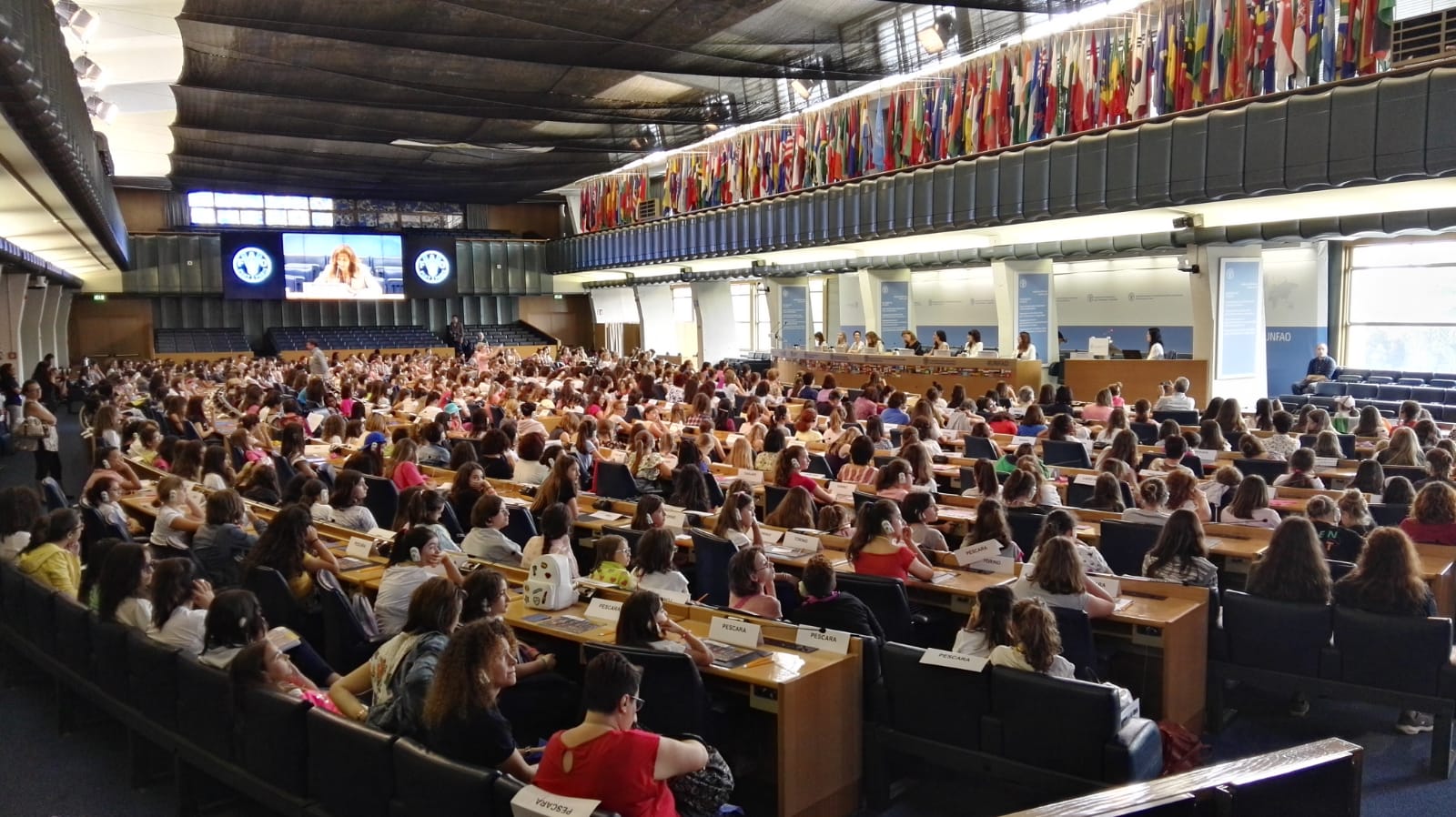 The first Zero Hunger citizens The Focolare youth, scattered all over the world, can give a strong personal daily contribution towards the achievement of the Zero Hunger goal by 2030. On October 16, 2018 FAO will celebrate its 73rd year and it will have the opportunity to re-launch this objective. Clara Velez, Head of the FAO office for the dissemination of promotional activities confirmed: “We will avail ourselves of this occasion to speak about various topics on newspapers, TV, in schools, on streets. Each year we are focussing on a particular issue (immigration, climate change…..), and this year our focus will be on zero hunger. It’s marvellous having you here with us today. On October 16, representatives from all countries will be seated in this same hall and they will be given the book you have received today.This book explains how we can combat hunger through our daily actions. The passport on its last page entitles you to become the first Zero Hunger citizens, with rights and duties that need to be respected”. But what are the duties of Zero Hunger citizens? Laura Hernandez from the FAO office for dissemination and promotional activities maintained: “One third of the food produced in the world is wasted and thrown away. I’m convinced that you do not want to participate in this scandal. There are certain things we can do at home. For example, when food is left over, one can freeze it or eat it the next day. When we go to a restaurant and do not manage to finish eating all the food, we can consume it later at home. Then, do check the food labels and do not be deceived. The expiry date indicates the date when the food ceases to be good for consumption; but if the label states that the food is “preferably consumed by…”, this means that it can be consumed even a few days after that date. Another important and precious commodity is water. We must not waste water, so the tap should be closed while we brush our teeth. And mum and dad should be reminded to use the dishwasher at full capacity, or to use the dryer only when needed”.
The first Zero Hunger citizens The Focolare youth, scattered all over the world, can give a strong personal daily contribution towards the achievement of the Zero Hunger goal by 2030. On October 16, 2018 FAO will celebrate its 73rd year and it will have the opportunity to re-launch this objective. Clara Velez, Head of the FAO office for the dissemination of promotional activities confirmed: “We will avail ourselves of this occasion to speak about various topics on newspapers, TV, in schools, on streets. Each year we are focussing on a particular issue (immigration, climate change…..), and this year our focus will be on zero hunger. It’s marvellous having you here with us today. On October 16, representatives from all countries will be seated in this same hall and they will be given the book you have received today.This book explains how we can combat hunger through our daily actions. The passport on its last page entitles you to become the first Zero Hunger citizens, with rights and duties that need to be respected”. But what are the duties of Zero Hunger citizens? Laura Hernandez from the FAO office for dissemination and promotional activities maintained: “One third of the food produced in the world is wasted and thrown away. I’m convinced that you do not want to participate in this scandal. There are certain things we can do at home. For example, when food is left over, one can freeze it or eat it the next day. When we go to a restaurant and do not manage to finish eating all the food, we can consume it later at home. Then, do check the food labels and do not be deceived. The expiry date indicates the date when the food ceases to be good for consumption; but if the label states that the food is “preferably consumed by…”, this means that it can be consumed even a few days after that date. Another important and precious commodity is water. We must not waste water, so the tap should be closed while we brush our teeth. And mum and dad should be reminded to use the dishwasher at full capacity, or to use the dryer only when needed”. 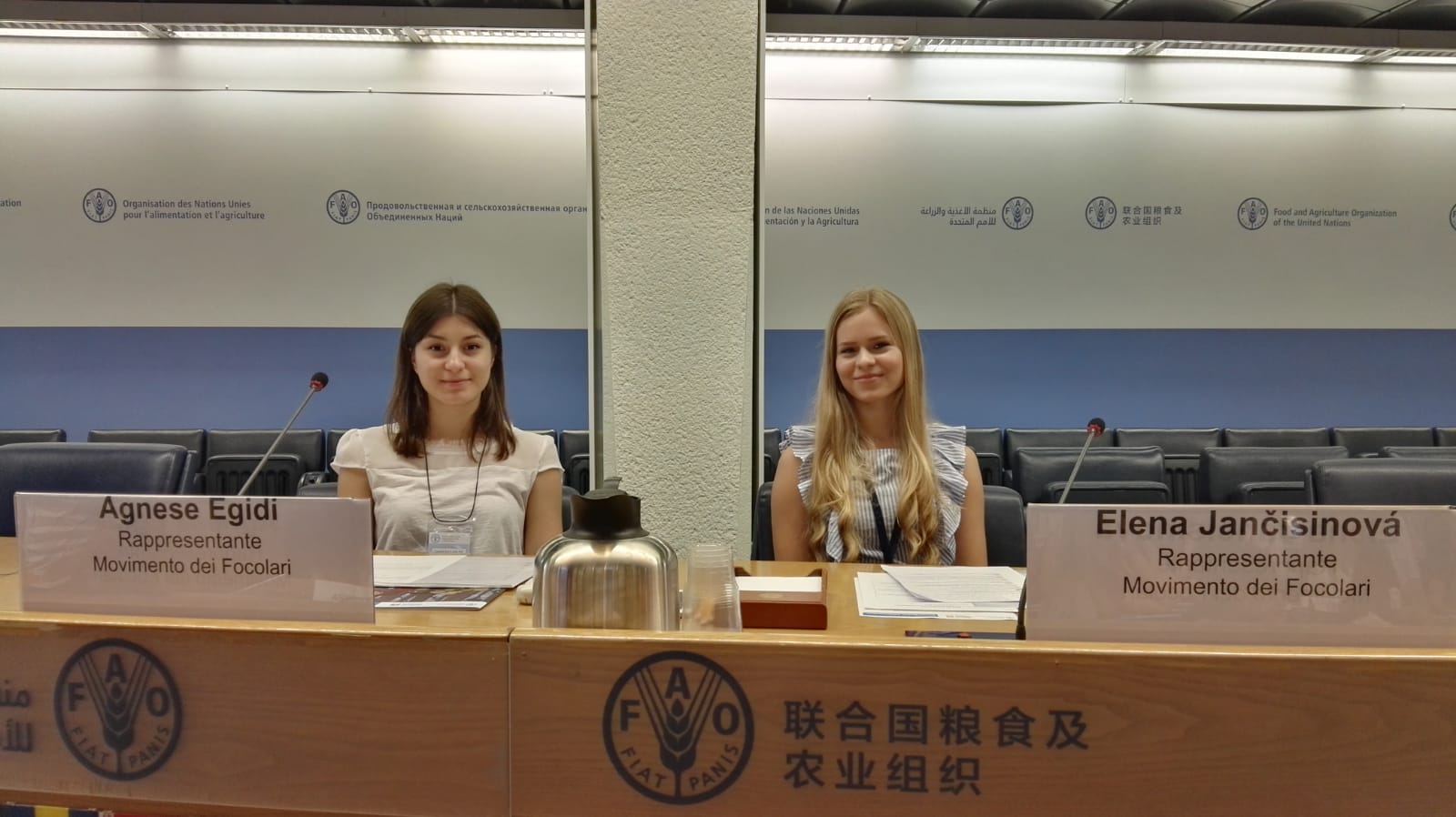 The Commitment Statement Finally even the girls voiced their thoughts. Elena and Agnes, who represented them said: “We are very honoured and happy to be here. From now on we will definitely contribute towards this goal with greater enthusiasm. We do feel part of the zero hunger generation. And what a great dream it is to imagine a world without hunger, even thanks to our contribution towards it! We are so happy to collaborate with FAO, because it is only by joining forces that we can manage to achieve such a high goal as Zero Hunger by 2030”. Focolare children and teenagers in 11 countries have been gathering ideas to try and find out how the problem of world hunger can be solved. “Our three H motto: head, heart and hands originated from these ideas, and our Commitment Statement came into being. Head for us means that we have to inform ourselves and study the problem both at a global and local level. Heart means that we that we have to make ourselves and others aware, and involve as many people as possible to achieve our goal. Then we need to act, so we have to make use of our hands” At the end of their visit, the girls handed over their Commitment Statement to FAO and there was the symbolic gesture of the passport: the girls wrote their commitments on this small document and signed it. They became the first #Zero Hunger citizens. Lorenzo Russo
The Commitment Statement Finally even the girls voiced their thoughts. Elena and Agnes, who represented them said: “We are very honoured and happy to be here. From now on we will definitely contribute towards this goal with greater enthusiasm. We do feel part of the zero hunger generation. And what a great dream it is to imagine a world without hunger, even thanks to our contribution towards it! We are so happy to collaborate with FAO, because it is only by joining forces that we can manage to achieve such a high goal as Zero Hunger by 2030”. Focolare children and teenagers in 11 countries have been gathering ideas to try and find out how the problem of world hunger can be solved. “Our three H motto: head, heart and hands originated from these ideas, and our Commitment Statement came into being. Head for us means that we have to inform ourselves and study the problem both at a global and local level. Heart means that we that we have to make ourselves and others aware, and involve as many people as possible to achieve our goal. Then we need to act, so we have to make use of our hands” At the end of their visit, the girls handed over their Commitment Statement to FAO and there was the symbolic gesture of the passport: the girls wrote their commitments on this small document and signed it. They became the first #Zero Hunger citizens. Lorenzo Russo
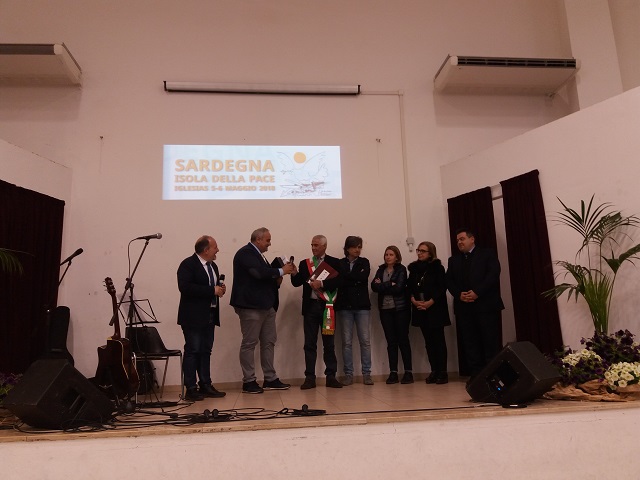
Jun 24, 2018 | Focolare Worldwide
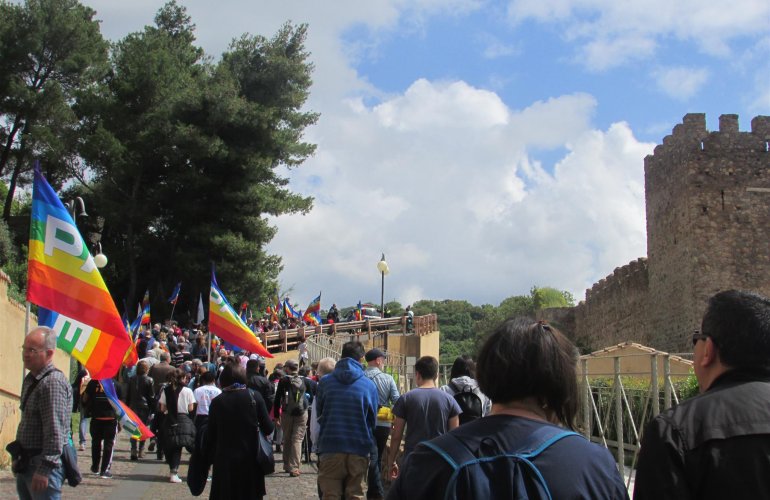 Sulcis-Iglesiente is an historical region of Sardinia, characterized not only by its impressive natural beauty, but also for the story of the mine workers: a human, spiritual, cultural and environmental patrimony. It is a unique jewel in the world, which has not yet expressed its full potential, also from the economical point of view. On March 3, 2017, a conference on disarmament was held in Calgriari organized by the Domenico Mangano Scuola di Partecipazione Politica. Several residents from Sulcis-Iglesiente were directly involved, since the headquarters of the RWM Italia is controlled by the Rheinmetall bomb factory, which sells bombs to Saudi Arabia and utilized for the war in Yemen. When this became known, a committee was formed one year ago, joining the forces for a common objective: reconverting the military factory into a civilian operation. This is the Comitato riconversione RWM for peace, a sustainable project, the reconversion of a war industry, disamament, public sharing in the reconversion process and the protection of the natural environmental and social patrimony of Sulcis-Iglesiente.”
Sulcis-Iglesiente is an historical region of Sardinia, characterized not only by its impressive natural beauty, but also for the story of the mine workers: a human, spiritual, cultural and environmental patrimony. It is a unique jewel in the world, which has not yet expressed its full potential, also from the economical point of view. On March 3, 2017, a conference on disarmament was held in Calgriari organized by the Domenico Mangano Scuola di Partecipazione Politica. Several residents from Sulcis-Iglesiente were directly involved, since the headquarters of the RWM Italia is controlled by the Rheinmetall bomb factory, which sells bombs to Saudi Arabia and utilized for the war in Yemen. When this became known, a committee was formed one year ago, joining the forces for a common objective: reconverting the military factory into a civilian operation. This is the Comitato riconversione RWM for peace, a sustainable project, the reconversion of a war industry, disamament, public sharing in the reconversion process and the protection of the natural environmental and social patrimony of Sulcis-Iglesiente.” 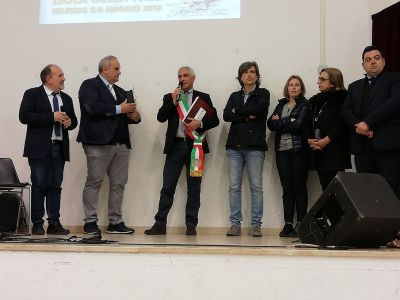 Cinzia Guaita from the Focolare Movement is one of the promoters of the project. She reports: “The work of the committee is not easy, because Sulcis-Iglesiante is a region where jobs are scarce and, the jobs that do exist are defended with pitchforks and shovels. It isn’t easy to insert a process that would bring about a change in thinking and doing things differently, which might turn out to be more risky.” “We’re a very close-knit and diverse network. Before, nobody talked about it. Now, the ethical, environmental and legal questions are widespread. There has been one cultural result, although it is a long-term process.” Where can the greatest change be seen? “Let’s take the topic of work: before, we coudn’t discuss it; whereas, now, along with work there are other topics like peace, justice – and that’s no small matter for such a poor region as ours.” You talk about confronting, but you all stress dialogue… “That’s true, we’re dialoging and we do that with everyone, because this is a problem that regards everyone and it can be resolved by looking at the problem from different points of view. Let me give you an example: We opened a table for a technical discussion with experts, to study a reconversion plan. There were technicians, university experts and others like Banca Etica, Protestant Church: The committee is a sort of laboratory, non-conclusive, the beginning of a concrete process.”
Cinzia Guaita from the Focolare Movement is one of the promoters of the project. She reports: “The work of the committee is not easy, because Sulcis-Iglesiante is a region where jobs are scarce and, the jobs that do exist are defended with pitchforks and shovels. It isn’t easy to insert a process that would bring about a change in thinking and doing things differently, which might turn out to be more risky.” “We’re a very close-knit and diverse network. Before, nobody talked about it. Now, the ethical, environmental and legal questions are widespread. There has been one cultural result, although it is a long-term process.” Where can the greatest change be seen? “Let’s take the topic of work: before, we coudn’t discuss it; whereas, now, along with work there are other topics like peace, justice – and that’s no small matter for such a poor region as ours.” You talk about confronting, but you all stress dialogue… “That’s true, we’re dialoging and we do that with everyone, because this is a problem that regards everyone and it can be resolved by looking at the problem from different points of view. Let me give you an example: We opened a table for a technical discussion with experts, to study a reconversion plan. There were technicians, university experts and others like Banca Etica, Protestant Church: The committee is a sort of laboratory, non-conclusive, the beginning of a concrete process.”  How is the RWM factory seen in the territory? “The factory has been inserted with a lot of benevolence in the local social dynamic, although it violates a national law that forbids the sale of arms to countries at war, or that doesn’t respect human rights; but it also provides for the possiblity receiving funds for the reconversion of factories that produce arms. So, the possiblities are there. Reconversion doesn’t mean taking a leap in the dark; it’s a shared growing process and an improvement in the life of everyone. What role has the press played in all this? “A very decisive role I would say, and we ourselves are amazed that the international press has shown interest. German television is watching us and has reported in Germany what is happening here. There is much silence about the wars, such as the wars in Yemen. Turning the spotlight on those conflicts has brought the problems of such places to the attention of the world. If we want to build peace, we can’t close our eyes. Everyone is needed if we want small local efforts to be broadcasted more widely. This is what loving a local territory means. It may be risky, but it’s worth the risk when it comes to peace.” Source: United World Project
How is the RWM factory seen in the territory? “The factory has been inserted with a lot of benevolence in the local social dynamic, although it violates a national law that forbids the sale of arms to countries at war, or that doesn’t respect human rights; but it also provides for the possiblity receiving funds for the reconversion of factories that produce arms. So, the possiblities are there. Reconversion doesn’t mean taking a leap in the dark; it’s a shared growing process and an improvement in the life of everyone. What role has the press played in all this? “A very decisive role I would say, and we ourselves are amazed that the international press has shown interest. German television is watching us and has reported in Germany what is happening here. There is much silence about the wars, such as the wars in Yemen. Turning the spotlight on those conflicts has brought the problems of such places to the attention of the world. If we want to build peace, we can’t close our eyes. Everyone is needed if we want small local efforts to be broadcasted more widely. This is what loving a local territory means. It may be risky, but it’s worth the risk when it comes to peace.” Source: United World Project
Jun 22, 2018 | Non categorizzato
http://vimeo.com/69074558 «The secret of true love is this, the secret lies in this: that the love we speak of is what is truly understood by the Gospel. The Gospel is the good news that Christ brought on earth, so it’s a love as it is conceived in God, not on earth. It’s a love that we see being lived by the persons of the Most Holy Trinity. For example, the Father loves everyone and lets the rain fall and makes the sun rise on the good and on the bad, he loves everyone. So it’s a love that puts us in the disposition to love all our brothers and sisters, so not only our relatives, friends or the ones we like, but we have to love everyone. Therefore, during the day, in order to love them, we have to single out every person we meet. A second requirement of this love, which does not exist on earth precisely because it comes from Heaven, is that we must be the first to love and not wait to be loved. Generally, one waits to be loved in order to love. Instead it must be like this: we must be the first to love and this is shown by Jesus, the second divine Person who became man, who died for us when we were yet sinners, which means that we certainly were not loving then. It’s a tangible love, like that of Jesus, who gave his life. It’s not a sentimental, platonic love, but one that becomes real. It’s a love that “makes itself one” with the other, with those who suffer and those who rejoice, and participate in the suffering and helps those who suffer or participates in the joy. If this love is practiced in the world, and the Movement lives it, … it’s the secret of the Movement. The Movement has lived it in all the nations of the world. Generally it has been reciprocated because people feel loved and get along well with us. So they ask us, “But why?” And we explain why we love. So a dialogue between us and others begins, and they are not all Christians, not all Catholic, but many times belonging to other religions, even non-believers. But even non-believers, in their DNA, have the idea of loving and the strength to love because they are created by God who is Love. This is something about love». Chiara Lubich Translation of an interview given by Erik Hendriks, Sylvester Production, May 24, 2004, for Belgian TV. www.centrochiaralubich.org
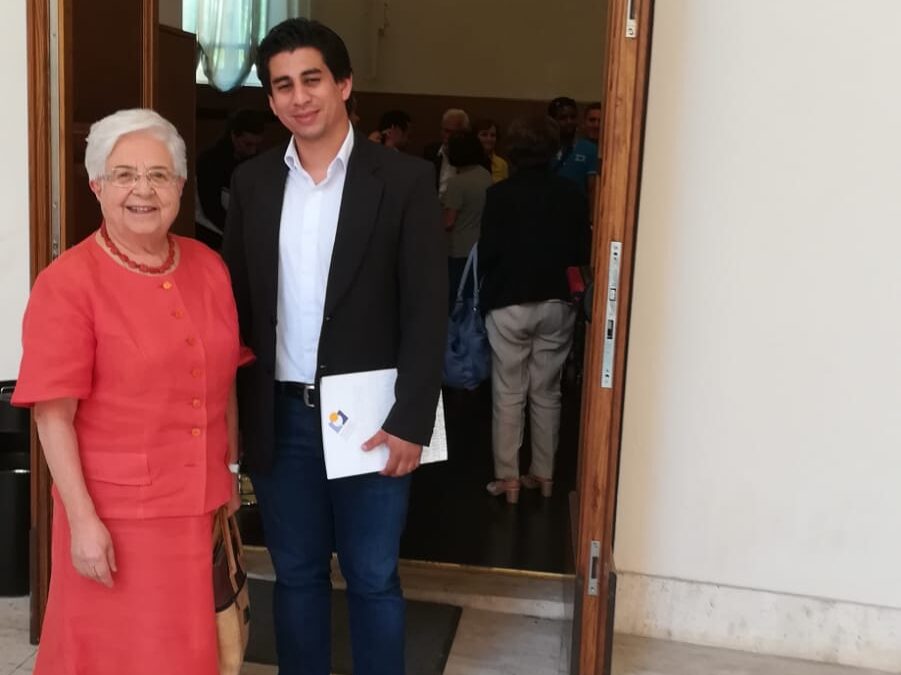
Jun 21, 2018 | Non categorizzato
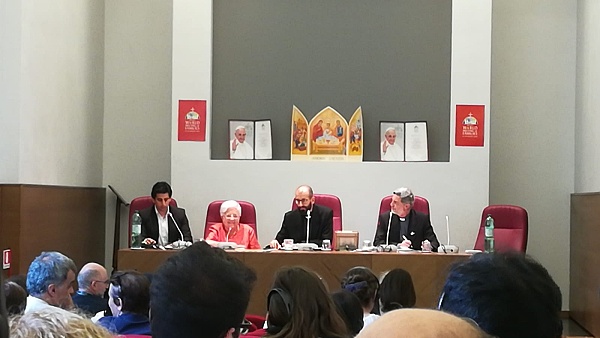 Organized by the Catholic Church’s Dicastery for Laity, Family and Life, the meeting coincided with the publication of the “Instrumentum laboris” of the next Synod of Catholic Bishops in October, which is dedicated to youth. This thought-provoking document includes the input of young people from around the world.. Kevin Farrell, the Dicastery’s Cardinal Prefect introduced the meeting. Msgr Carlos Simón Vázquez, delegate for the Family and Life section presented the latest developments concerning the IX World Meeting of Families which will be celebrated in Dublin from 21 to 26 August. Fr Alexandre Awi Mello, the Dicastery’s Secretary reported on the preparations for next October’s Synod of Bishops. Giovanna Guerrieri Nalin, of the Youth Office spoke about the next World Youth Day, scheduled to be held in Panama in January 2019. In the afternoon, the General Secretary of the Synod of Bishops, Cardinal Lorenzo Baldisseri, presented the aims, the expectations, and the prospects of the upcoming Synod.
Organized by the Catholic Church’s Dicastery for Laity, Family and Life, the meeting coincided with the publication of the “Instrumentum laboris” of the next Synod of Catholic Bishops in October, which is dedicated to youth. This thought-provoking document includes the input of young people from around the world.. Kevin Farrell, the Dicastery’s Cardinal Prefect introduced the meeting. Msgr Carlos Simón Vázquez, delegate for the Family and Life section presented the latest developments concerning the IX World Meeting of Families which will be celebrated in Dublin from 21 to 26 August. Fr Alexandre Awi Mello, the Dicastery’s Secretary reported on the preparations for next October’s Synod of Bishops. Giovanna Guerrieri Nalin, of the Youth Office spoke about the next World Youth Day, scheduled to be held in Panama in January 2019. In the afternoon, the General Secretary of the Synod of Bishops, Cardinal Lorenzo Baldisseri, presented the aims, the expectations, and the prospects of the upcoming Synod. 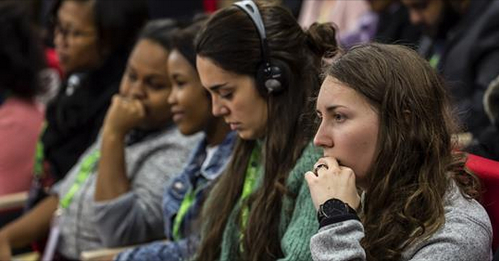 The contribution of the Focolare Movement The Focolare Movement was among the participants, represented by a young person from Salvador, Nelson Vanegas and Focolare President Maria Voce, who reflected on how “apostolic initiatives directed towards young people in the areas of announcing the faith and of vocation, can be rooted in the characteristic experience born from the charism of unity”. Back in the 1960s young people turned to Chiara as she called for a new type of revolution, inspired by Gospel love (“Youth of the world unite!”). This has led to the development of new ways and centres of formation and witness, shaped together with the young people themselves. These cover areas such as the gift that the young and older can be for one another, the link between life and thought, the living out of fraternity to respond to the challenges and problems of today’s world.
The contribution of the Focolare Movement The Focolare Movement was among the participants, represented by a young person from Salvador, Nelson Vanegas and Focolare President Maria Voce, who reflected on how “apostolic initiatives directed towards young people in the areas of announcing the faith and of vocation, can be rooted in the characteristic experience born from the charism of unity”. Back in the 1960s young people turned to Chiara as she called for a new type of revolution, inspired by Gospel love (“Youth of the world unite!”). This has led to the development of new ways and centres of formation and witness, shaped together with the young people themselves. These cover areas such as the gift that the young and older can be for one another, the link between life and thought, the living out of fraternity to respond to the challenges and problems of today’s world. 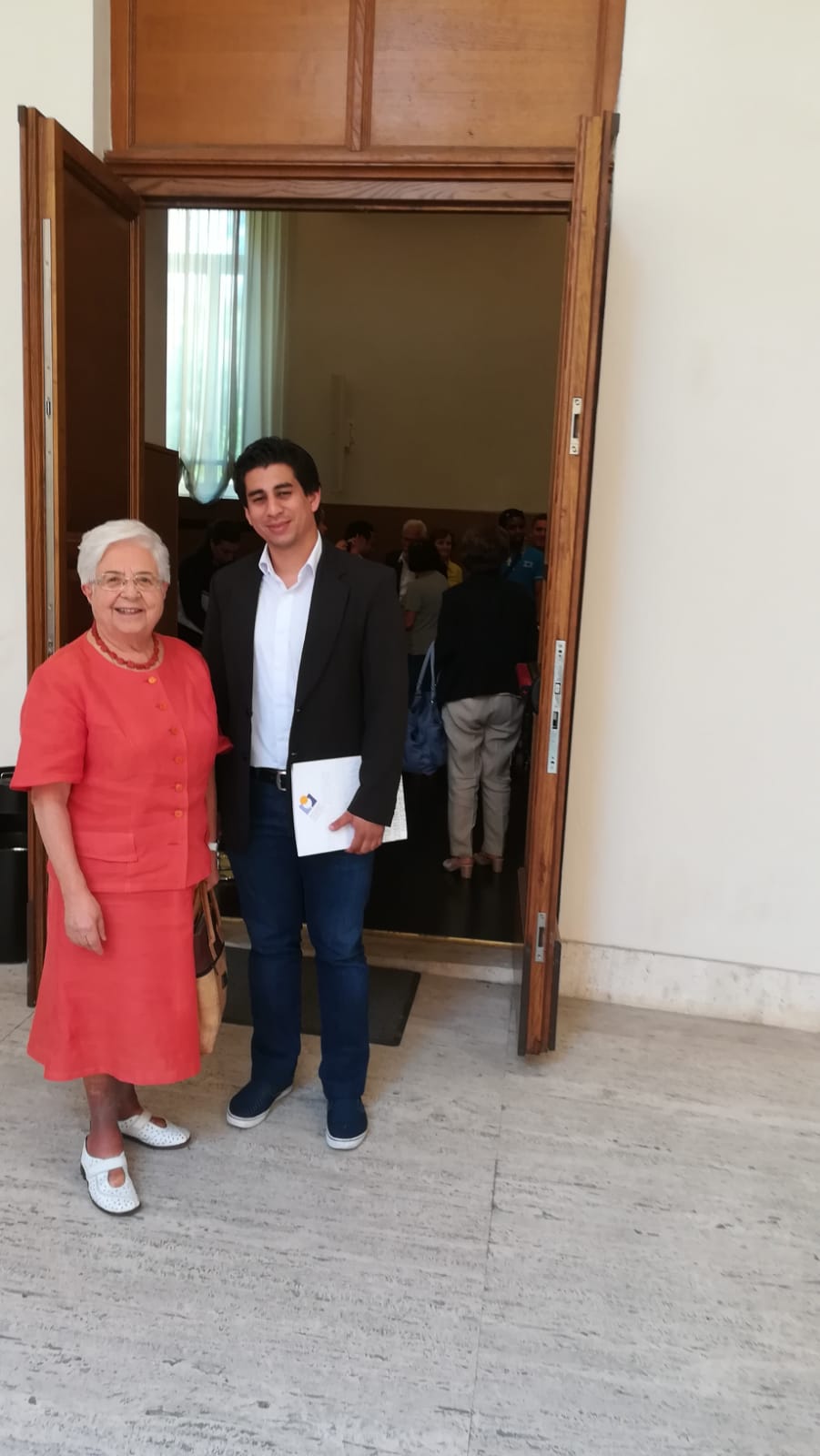 Nelson had participated in the presynodal meeting in March. He presented the Focolare’s youth-focused activity. “In annual summer schools of formation for young people, we cover theological and moral formation. This involves a style of accompanying the young which is in tune with Pope Francis’ suggestions. Schools of vocational discernment offer a real pathway for young people aged between 23 and 30 years, a crucial age, to face up to making definitive choices for their personal life plan”. There are also opportunities for young people to experience the link between life and study. He explained how “the University Institute of Sophia, based in Loppiano (near Florence, Italy), aims to enable the interaction of areas of knowledge through an academic project centred on the experience of a studying community. Research, ideas and life are shared not only between students from different countries and backgrounds, but also between students and academics”. Other opportunities for youth formation are offered in national and international congresses and “schools” for the Gen (the young generations of the Focolare Movement). Finally, Nelson announced the Genfest. “It is a formative experience, based on a widespread ongoing commitment to inclusion, welcoming and listening to others, which leads to true dialogue and to the construction of deep relationships. A Genfest is above all a profound spiritual experience, through which in past years, many young people have heard or reheard the call of God, to live for something great, to fulfill the last prayer and dream of Jesus”. The next Genfest is almost here: in Manila, the Philippines, 6-8 July, with the title “Beyond all borders”.
Nelson had participated in the presynodal meeting in March. He presented the Focolare’s youth-focused activity. “In annual summer schools of formation for young people, we cover theological and moral formation. This involves a style of accompanying the young which is in tune with Pope Francis’ suggestions. Schools of vocational discernment offer a real pathway for young people aged between 23 and 30 years, a crucial age, to face up to making definitive choices for their personal life plan”. There are also opportunities for young people to experience the link between life and study. He explained how “the University Institute of Sophia, based in Loppiano (near Florence, Italy), aims to enable the interaction of areas of knowledge through an academic project centred on the experience of a studying community. Research, ideas and life are shared not only between students from different countries and backgrounds, but also between students and academics”. Other opportunities for youth formation are offered in national and international congresses and “schools” for the Gen (the young generations of the Focolare Movement). Finally, Nelson announced the Genfest. “It is a formative experience, based on a widespread ongoing commitment to inclusion, welcoming and listening to others, which leads to true dialogue and to the construction of deep relationships. A Genfest is above all a profound spiritual experience, through which in past years, many young people have heard or reheard the call of God, to live for something great, to fulfill the last prayer and dream of Jesus”. The next Genfest is almost here: in Manila, the Philippines, 6-8 July, with the title “Beyond all borders”.
Jun 21, 2018 | Focolare Worldwide
Pope Francis has embarked on an ecumenical pilgrimage which is taking place today at the Ecumenical Centre in Geneva (Switzerland), on the occasion of the 70th anniversary of the foundation of the World Council of Churches (WCC). The theme of the celebration: “Walking, praying and working together”. The WCC is the largest and most inclusive body among the various ecumenical organizations. Founded in Amsterdam, in the Netherlands, in 1948, it currently comprises about 350 churches in 110 countries around the world and represents about 500 million Christians. Based in Geneva, it includes most of the Orthodox churches, numerous historical Protestant churches (Anglican, Baptist, Lutheran, Methodist, the Reformed Church) and several independent churches. The Catholic Church is not a member of WCC, but Catholic theologians work in important commissions as fully fledged members. Among the scheduled appointments include the common prayer and the afternoon meeting in the presence of the Reverend Olav Fykse Tveit and Mr Agnes Abuom, respectively Secretary General and Moderator of WCC. In conclusion there will be a significant greeting to the eight members of North Korea and South Korea.
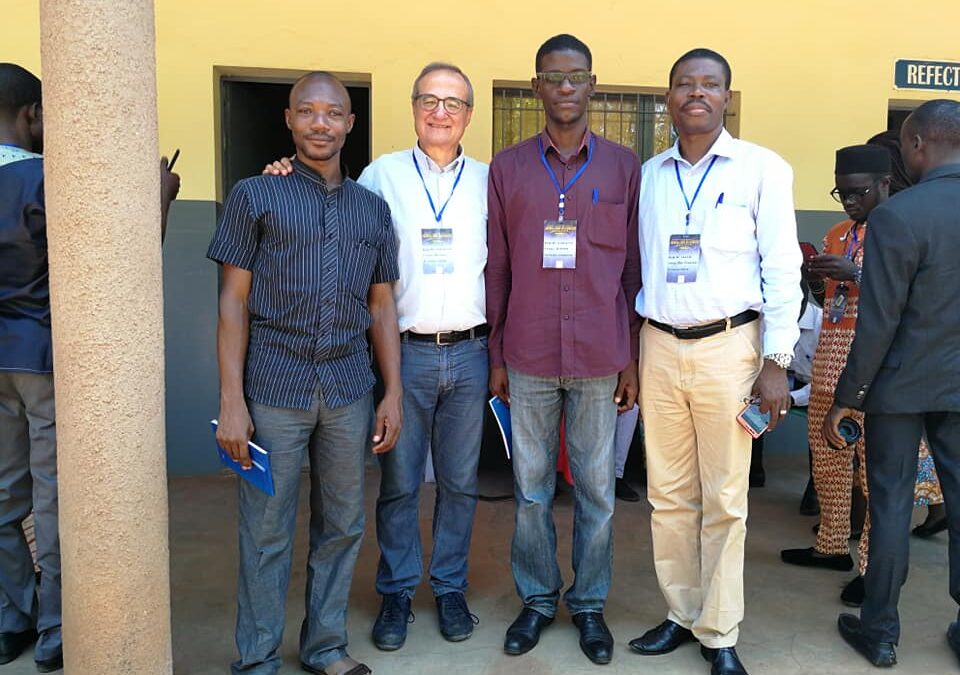
Jun 20, 2018 | Focolare Worldwide
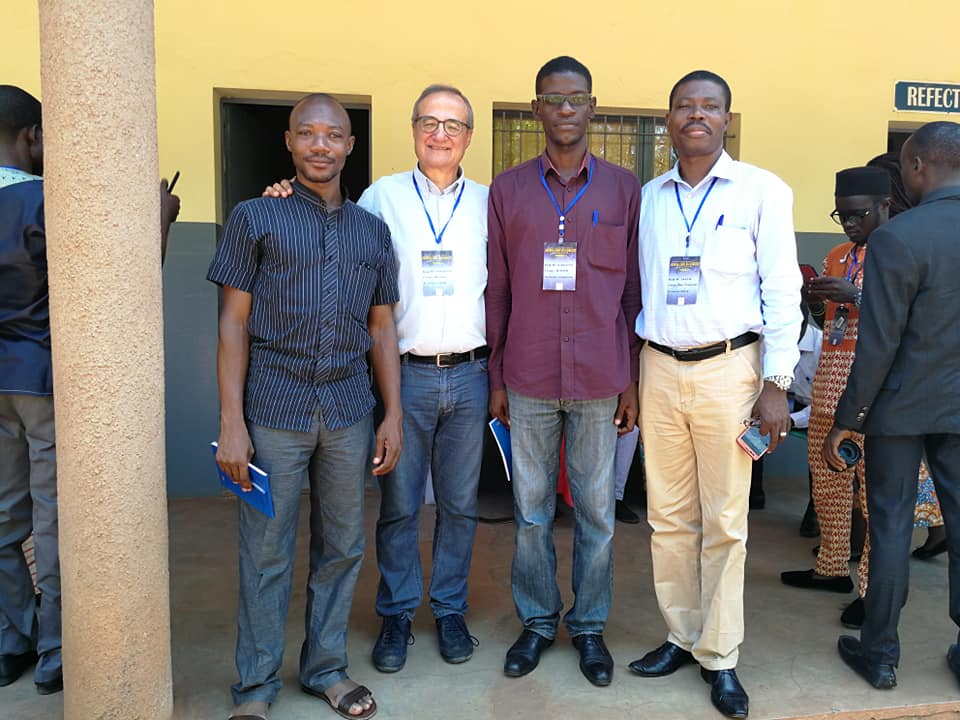 A seminar on the Journalism of Dialogue took place in Bodo-Dioulasso in Burkina Faso from 9 to 13 June. Michele Zanzucchi from Italy, Guy Roland from Benin, Armand Djoualeu from Cameroon plus many Christian and Muslim professionals and students from Niger, Mali, Ivory Coast, Benin and Burkina Faso participated. The aim of the seminar was to equip journalists with the skills of dialogue whereby respect and responsibility is shown towards each person. The seminar opened with a round table on the “journalism of migration” which was attended by representatives from the government and from the Catholic church. One of the proposals emerging from this was the desire to form a regional network of journalists who can correctly form and inform the public about migration, especially migration to Europe.
A seminar on the Journalism of Dialogue took place in Bodo-Dioulasso in Burkina Faso from 9 to 13 June. Michele Zanzucchi from Italy, Guy Roland from Benin, Armand Djoualeu from Cameroon plus many Christian and Muslim professionals and students from Niger, Mali, Ivory Coast, Benin and Burkina Faso participated. The aim of the seminar was to equip journalists with the skills of dialogue whereby respect and responsibility is shown towards each person. The seminar opened with a round table on the “journalism of migration” which was attended by representatives from the government and from the Catholic church. One of the proposals emerging from this was the desire to form a regional network of journalists who can correctly form and inform the public about migration, especially migration to Europe.
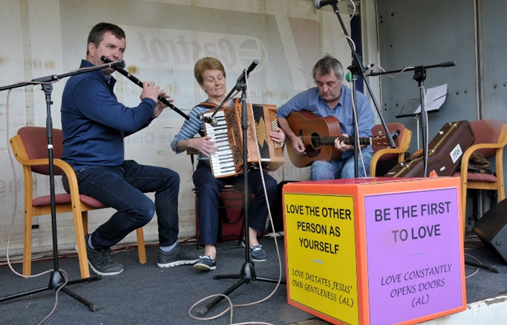
Jun 20, 2018 | Focolare Worldwide
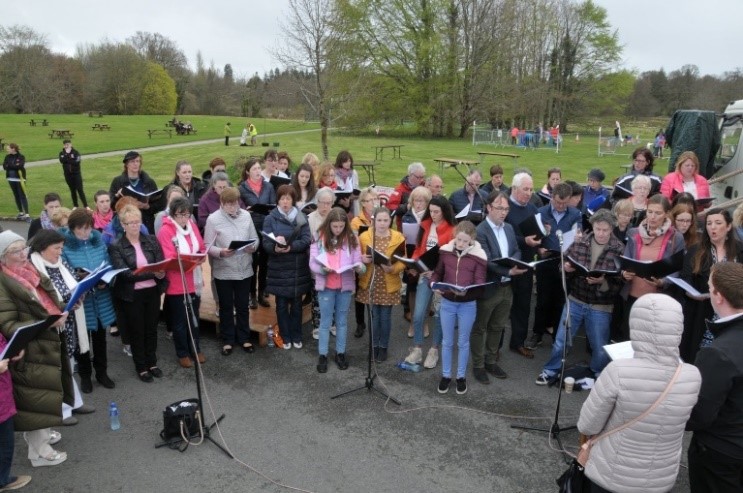 Lough Key Forest Park is close to 2,000 acres of silence, natural paths, majestic cedars and a lake on the south coast oif Lough Key, 25 miles southwest of Sligo Town and 2 miles east of Boyle. This was the setting for a day for families organized by the Diocese of Elphin at the end of April. In collaboration with Bishop Kevin Doran, one of the promoters for the event was the Focolare Movement. “All are invited to an atmosphere full of play, sharing and friendship,” the bishop had said, “including families of other religious denominations, neighbors and friends.” The goal was to prepare for the main event with Pope Francis in the Irish capital, which will bring together families from all over the world at the end of August. The theme will be “The Gospel of the Family: Joy for the World.” Every three years, this international event puts the focus once again on Christian families, as cornerstones of society. Following the opening on August 21, which will be held simultaneously in all the Irish dioceses, there will be an international conference in Dublin for three days (22–24), featuring experts from various parts of the world, experiences, workshops and activities for children and teens. With the Holy Father’s arrival on August 25, there will be an immense festival for families, a chance to hear music and experiences from the continents, as well as, naturally, long-awaited words from the pope. Pope Francis will celebrate a solemn Eucharistic service on the 26th at Phoenix Park in Dublin, which will close the event. “We aren’t many in this part of Ireland,” the Focolare community writes, “but we wanted to respond to the bishop’s invitation.” For a year now, Ireland has been more aware of the complex dynamics in each family, as well its role in society. Together with all the families of the diocese, preparations are underway for collective reflection in the light of the apostolic exhortation Amoris Laetiita. Supported by the entire Focolare community, Evelyn is part of the preparatory committee. “For me this is a great opportunity to build relationships of unity with everyone. Every idea, every contribution, every decision or action to take has been the result of moving forward together with the bishop. There’s been a climate of mutual love created among us all.”
Lough Key Forest Park is close to 2,000 acres of silence, natural paths, majestic cedars and a lake on the south coast oif Lough Key, 25 miles southwest of Sligo Town and 2 miles east of Boyle. This was the setting for a day for families organized by the Diocese of Elphin at the end of April. In collaboration with Bishop Kevin Doran, one of the promoters for the event was the Focolare Movement. “All are invited to an atmosphere full of play, sharing and friendship,” the bishop had said, “including families of other religious denominations, neighbors and friends.” The goal was to prepare for the main event with Pope Francis in the Irish capital, which will bring together families from all over the world at the end of August. The theme will be “The Gospel of the Family: Joy for the World.” Every three years, this international event puts the focus once again on Christian families, as cornerstones of society. Following the opening on August 21, which will be held simultaneously in all the Irish dioceses, there will be an international conference in Dublin for three days (22–24), featuring experts from various parts of the world, experiences, workshops and activities for children and teens. With the Holy Father’s arrival on August 25, there will be an immense festival for families, a chance to hear music and experiences from the continents, as well as, naturally, long-awaited words from the pope. Pope Francis will celebrate a solemn Eucharistic service on the 26th at Phoenix Park in Dublin, which will close the event. “We aren’t many in this part of Ireland,” the Focolare community writes, “but we wanted to respond to the bishop’s invitation.” For a year now, Ireland has been more aware of the complex dynamics in each family, as well its role in society. Together with all the families of the diocese, preparations are underway for collective reflection in the light of the apostolic exhortation Amoris Laetiita. Supported by the entire Focolare community, Evelyn is part of the preparatory committee. “For me this is a great opportunity to build relationships of unity with everyone. Every idea, every contribution, every decision or action to take has been the result of moving forward together with the bishop. There’s been a climate of mutual love created among us all.”  At the entrance to the immense public park, hanging from the tree branches, were the six sides of the Cube of Love, which included words from Amoris Laetitia and Chiara Lubich on the family. Moving in the wind, the cube greeted the public upon arrival. The same cube was rolled on stage at the beginning of the day, so that everyone could tune in to the message, “Be the first to love.” The day was a festive sequence of music and workshops on caring for the environment, family games, entertainment, face painting, dance and helping the needy. There was a particularly intense moment of prayer together, led by the Anglican and Catholic bishops. They later cut a cake together, which not by chance was cube shaped. The moment was captured permanently by the local paper, the Roscommon Herald, and other websites and newsletters. At the end of the day one of the participants, Andrew, sang a song he had written about the three words that Pope Francis had suggested for family life: “Please”, “Thanks” and “Sorry.” “As I was circulating among the people,” said Áine from the Focolare, “I thought of the words from ‘The great attraction of modern times,’ a meditation written by Chiara Lubich. I felt they described that moment, in the midst of a crowd made up of people from faraway villages and countries – not just Catholics, but other religious denominations. “Some were from even further away, like those who had just arrived as refugees and asylum seekers, mostly Muslims from Africa and the Middle East. They were surprised to find such a focus on the family in Ireland as well.”
At the entrance to the immense public park, hanging from the tree branches, were the six sides of the Cube of Love, which included words from Amoris Laetitia and Chiara Lubich on the family. Moving in the wind, the cube greeted the public upon arrival. The same cube was rolled on stage at the beginning of the day, so that everyone could tune in to the message, “Be the first to love.” The day was a festive sequence of music and workshops on caring for the environment, family games, entertainment, face painting, dance and helping the needy. There was a particularly intense moment of prayer together, led by the Anglican and Catholic bishops. They later cut a cake together, which not by chance was cube shaped. The moment was captured permanently by the local paper, the Roscommon Herald, and other websites and newsletters. At the end of the day one of the participants, Andrew, sang a song he had written about the three words that Pope Francis had suggested for family life: “Please”, “Thanks” and “Sorry.” “As I was circulating among the people,” said Áine from the Focolare, “I thought of the words from ‘The great attraction of modern times,’ a meditation written by Chiara Lubich. I felt they described that moment, in the midst of a crowd made up of people from faraway villages and countries – not just Catholics, but other religious denominations. “Some were from even further away, like those who had just arrived as refugees and asylum seekers, mostly Muslims from Africa and the Middle East. They were surprised to find such a focus on the family in Ireland as well.”
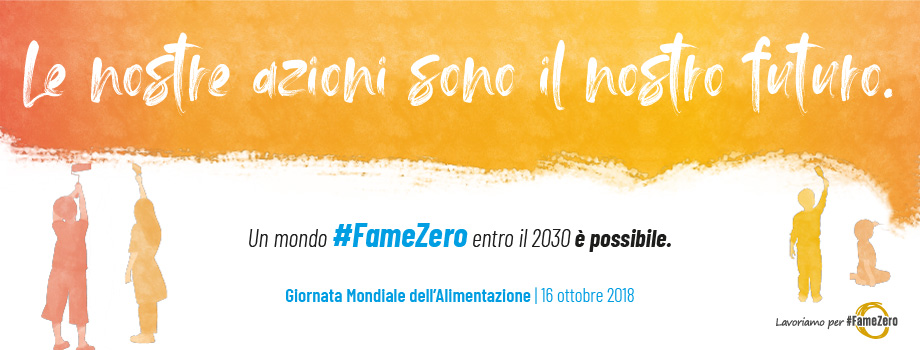
Jun 19, 2018 | Non categorizzato
 The adolescents and youths can become the first generation to succeed in uprooting hunger in the world. This is stated in the 17 Sustainable Development Goals (SDG), approved on 25 September 2015 by the 193 Member States of the UN, with the commitment to achieve them in 15 years (2015-2030). The second objective, “Zero Hunger,” is the core of this programme. To be able to reach it, the UN’s Food and Agriculture Organisation (FAO) places its bet on the new generations. The boys and girls of the Focolare Movement have decided to make this the key theme of their annual training congress, from 20 to 24 June. While 630 girls will meet at the International Mariapolis Centre in Castel Gandolfo, 250 boys will hold their meetings in the international town of Loppiano (Florence). The participants shall come from various countries of Europe and South America. In Loppiano, the 250 boys will deepen the “Zero Hunger” theme and try to see how to actualise it in daily life, rediscovering values like courage, forgiveness, service, endeavour, spirituality, responsibility, loyalty, and acknowledgment of the capacities of others. The girls instead shall live a special day on 22 June, when they will visit the international headquarters of the FAO in the centre of Rome, to participate in the discussion on the “Zero Hunger” goal. At the end of the session, they will receive the “Zero Hunger Citizens” passport. Replay the streaming on 22 June 2018, at 11 am (Rome). Lorenzo Russo
The adolescents and youths can become the first generation to succeed in uprooting hunger in the world. This is stated in the 17 Sustainable Development Goals (SDG), approved on 25 September 2015 by the 193 Member States of the UN, with the commitment to achieve them in 15 years (2015-2030). The second objective, “Zero Hunger,” is the core of this programme. To be able to reach it, the UN’s Food and Agriculture Organisation (FAO) places its bet on the new generations. The boys and girls of the Focolare Movement have decided to make this the key theme of their annual training congress, from 20 to 24 June. While 630 girls will meet at the International Mariapolis Centre in Castel Gandolfo, 250 boys will hold their meetings in the international town of Loppiano (Florence). The participants shall come from various countries of Europe and South America. In Loppiano, the 250 boys will deepen the “Zero Hunger” theme and try to see how to actualise it in daily life, rediscovering values like courage, forgiveness, service, endeavour, spirituality, responsibility, loyalty, and acknowledgment of the capacities of others. The girls instead shall live a special day on 22 June, when they will visit the international headquarters of the FAO in the centre of Rome, to participate in the discussion on the “Zero Hunger” goal. At the end of the session, they will receive the “Zero Hunger Citizens” passport. Replay the streaming on 22 June 2018, at 11 am (Rome). Lorenzo Russo







 Sulcis-Iglesiente is an historical region of Sardinia, characterized not only by its impressive natural beauty, but also for the story of the mine workers: a human, spiritual, cultural and environmental patrimony. It is a unique jewel in the world, which has not yet expressed its full potential, also from the economical point of view. On March 3, 2017, a conference on disarmament was held in Calgriari organized by the Domenico Mangano Scuola di Partecipazione Politica. Several residents from Sulcis-Iglesiente were directly involved, since the headquarters of the RWM Italia is controlled by the Rheinmetall bomb factory, which sells bombs to Saudi Arabia and utilized for the war in Yemen. When this became known, a committee was formed one year ago, joining the forces for a common objective: reconverting the military factory into a civilian operation. This is
Sulcis-Iglesiente is an historical region of Sardinia, characterized not only by its impressive natural beauty, but also for the story of the mine workers: a human, spiritual, cultural and environmental patrimony. It is a unique jewel in the world, which has not yet expressed its full potential, also from the economical point of view. On March 3, 2017, a conference on disarmament was held in Calgriari organized by the Domenico Mangano Scuola di Partecipazione Politica. Several residents from Sulcis-Iglesiente were directly involved, since the headquarters of the RWM Italia is controlled by the Rheinmetall bomb factory, which sells bombs to Saudi Arabia and utilized for the war in Yemen. When this became known, a committee was formed one year ago, joining the forces for a common objective: reconverting the military factory into a civilian operation. This is 
 Organized by the Catholic Church’s Dicastery for Laity, Family and Life, the meeting coincided with the publication of the “Instrumentum laboris” of the next Synod of Catholic Bishops in October, which is dedicated to youth. This thought-provoking document includes the input of young people from around the world.. Kevin Farrell, the Dicastery’s Cardinal Prefect introduced the meeting. Msgr Carlos Simón Vázquez, delegate for the Family and Life section presented the latest developments concerning the IX World Meeting of Families which will be celebrated in Dublin from 21 to 26 August. Fr Alexandre Awi Mello, the Dicastery’s Secretary reported on the preparations for next October’s Synod of Bishops. Giovanna Guerrieri Nalin, of the Youth Office spoke about the next World Youth Day, scheduled to be held in Panama in January 2019. In the afternoon, the General Secretary of the Synod of Bishops, Cardinal Lorenzo Baldisseri, presented the aims, the expectations, and the prospects of the upcoming Synod.
Organized by the Catholic Church’s Dicastery for Laity, Family and Life, the meeting coincided with the publication of the “Instrumentum laboris” of the next Synod of Catholic Bishops in October, which is dedicated to youth. This thought-provoking document includes the input of young people from around the world.. Kevin Farrell, the Dicastery’s Cardinal Prefect introduced the meeting. Msgr Carlos Simón Vázquez, delegate for the Family and Life section presented the latest developments concerning the IX World Meeting of Families which will be celebrated in Dublin from 21 to 26 August. Fr Alexandre Awi Mello, the Dicastery’s Secretary reported on the preparations for next October’s Synod of Bishops. Giovanna Guerrieri Nalin, of the Youth Office spoke about the next World Youth Day, scheduled to be held in Panama in January 2019. In the afternoon, the General Secretary of the Synod of Bishops, Cardinal Lorenzo Baldisseri, presented the aims, the expectations, and the prospects of the upcoming Synod.  The contribution of the Focolare Movement The Focolare Movement was among the participants, represented by a young person from Salvador, Nelson Vanegas and Focolare President Maria Voce, who reflected on how “apostolic initiatives directed towards young people in the areas of announcing the faith and of vocation, can be rooted in the characteristic experience born from the charism of unity”. Back in the 1960s young people turned to Chiara as she called for a new type of revolution, inspired by Gospel love (“Youth of the world unite!”). This has led to the development of new ways and centres of formation and witness, shaped together with the young people themselves. These cover areas such as the gift that the young and older can be for one another, the link between life and thought, the living out of fraternity to respond to the challenges and problems of today’s world.
The contribution of the Focolare Movement The Focolare Movement was among the participants, represented by a young person from Salvador, Nelson Vanegas and Focolare President Maria Voce, who reflected on how “apostolic initiatives directed towards young people in the areas of announcing the faith and of vocation, can be rooted in the characteristic experience born from the charism of unity”. Back in the 1960s young people turned to Chiara as she called for a new type of revolution, inspired by Gospel love (“Youth of the world unite!”). This has led to the development of new ways and centres of formation and witness, shaped together with the young people themselves. These cover areas such as the gift that the young and older can be for one another, the link between life and thought, the living out of fraternity to respond to the challenges and problems of today’s world.  Nelson had participated in the presynodal meeting in March. He presented the Focolare’s youth-focused activity. “In annual summer schools of formation for young people, we cover theological and moral formation. This involves a style of accompanying the young which is in tune with Pope Francis’ suggestions. Schools of vocational discernment offer a real pathway for young people aged between 23 and 30 years, a crucial age, to face up to making definitive choices for their personal life plan”. There are also opportunities for young people to experience the link between life and study. He explained how “the University Institute of Sophia, based in Loppiano (near Florence, Italy), aims to enable the interaction of areas of knowledge through an academic project centred on the experience of a studying community. Research, ideas and life are shared not only between students from different countries and backgrounds, but also between students and academics”. Other opportunities for youth formation are offered in national and international congresses and “schools” for the Gen (the young generations of the Focolare Movement). Finally, Nelson announced the Genfest. “It is a formative experience, based on a widespread ongoing commitment to inclusion, welcoming and listening to others, which leads to true dialogue and to the construction of deep relationships. A Genfest is above all a profound spiritual experience, through which in past years, many young people have heard or reheard the call of God, to live for something great, to fulfill the last prayer and dream of Jesus”. The next Genfest is almost here: in Manila, the Philippines, 6-8 July, with the title “Beyond all borders”.
Nelson had participated in the presynodal meeting in March. He presented the Focolare’s youth-focused activity. “In annual summer schools of formation for young people, we cover theological and moral formation. This involves a style of accompanying the young which is in tune with Pope Francis’ suggestions. Schools of vocational discernment offer a real pathway for young people aged between 23 and 30 years, a crucial age, to face up to making definitive choices for their personal life plan”. There are also opportunities for young people to experience the link between life and study. He explained how “the University Institute of Sophia, based in Loppiano (near Florence, Italy), aims to enable the interaction of areas of knowledge through an academic project centred on the experience of a studying community. Research, ideas and life are shared not only between students from different countries and backgrounds, but also between students and academics”. Other opportunities for youth formation are offered in national and international congresses and “schools” for the Gen (the young generations of the Focolare Movement). Finally, Nelson announced the Genfest. “It is a formative experience, based on a widespread ongoing commitment to inclusion, welcoming and listening to others, which leads to true dialogue and to the construction of deep relationships. A Genfest is above all a profound spiritual experience, through which in past years, many young people have heard or reheard the call of God, to live for something great, to fulfill the last prayer and dream of Jesus”. The next Genfest is almost here: in Manila, the Philippines, 6-8 July, with the title “Beyond all borders”.
 A seminar on the Journalism of Dialogue took place in Bodo-Dioulasso in
A seminar on the Journalism of Dialogue took place in Bodo-Dioulasso in 
 Lough Key Forest Park is close to 2,000 acres of silence, natural paths, majestic cedars and a lake on the south coast oif Lough Key, 25 miles southwest of Sligo Town and 2 miles east of Boyle. This was the setting for a day for families organized by the Diocese of Elphin at the end of April. In collaboration with Bishop Kevin Doran, one of the promoters for the event was the Focolare Movement. “All are invited to an atmosphere full of play, sharing and friendship,” the bishop had said, “including families of other religious denominations, neighbors and friends.” The goal was to prepare for the main event with Pope Francis in the Irish capital, which will bring together families from all over the world at the end of August. The theme will be “The Gospel of the Family: Joy for the World.” Every three years, this international event puts the focus once again on Christian families, as cornerstones of society. Following the opening on August 21, which will be held simultaneously in all the Irish dioceses, there will be an international conference in Dublin for three days (22–24), featuring experts from various parts of the world, experiences, workshops and activities for children and teens. With the Holy Father’s arrival on August 25, there will be an immense
Lough Key Forest Park is close to 2,000 acres of silence, natural paths, majestic cedars and a lake on the south coast oif Lough Key, 25 miles southwest of Sligo Town and 2 miles east of Boyle. This was the setting for a day for families organized by the Diocese of Elphin at the end of April. In collaboration with Bishop Kevin Doran, one of the promoters for the event was the Focolare Movement. “All are invited to an atmosphere full of play, sharing and friendship,” the bishop had said, “including families of other religious denominations, neighbors and friends.” The goal was to prepare for the main event with Pope Francis in the Irish capital, which will bring together families from all over the world at the end of August. The theme will be “The Gospel of the Family: Joy for the World.” Every three years, this international event puts the focus once again on Christian families, as cornerstones of society. Following the opening on August 21, which will be held simultaneously in all the Irish dioceses, there will be an international conference in Dublin for three days (22–24), featuring experts from various parts of the world, experiences, workshops and activities for children and teens. With the Holy Father’s arrival on August 25, there will be an immense 